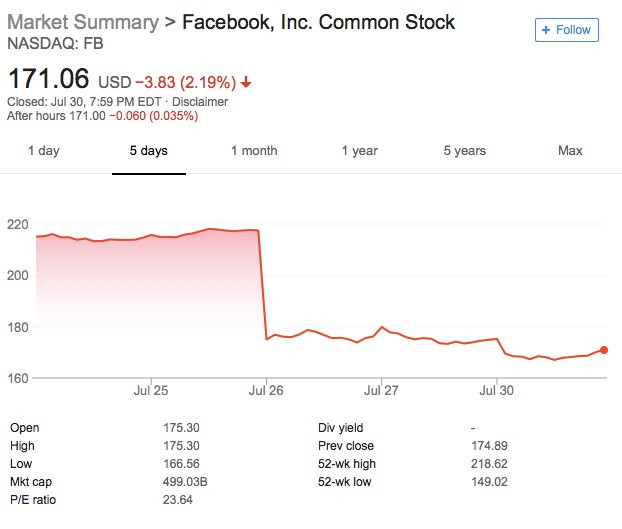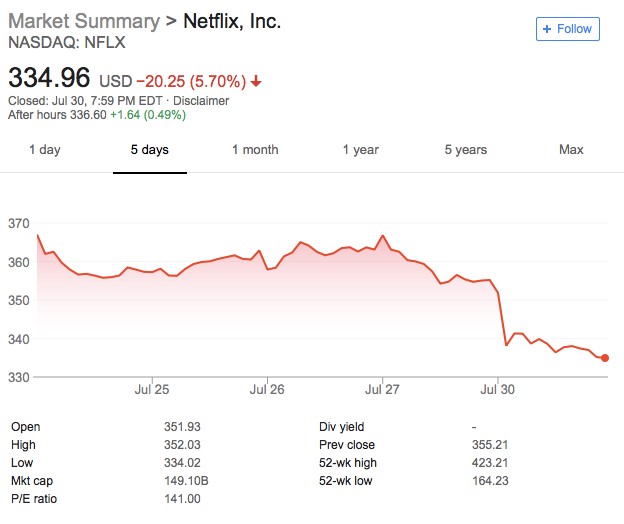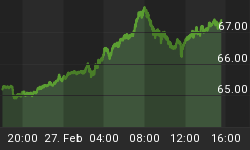Multiple big names are predicting that we’re only at the beginning of a market sell-off, and when the real correction comes, it’s going to be huge—and very painful.
“With Amazon’s strong quarter out of the way, and a very strong 2Q GDP number on the tape, investors were finally faced with the proverbial question of ’what do I have to look forward to now?’” Morgan Stanley said in a note to clients.
“The selling started slowly, built steadily, and left the biggest winners of the year down the most. The bottom line for us is that we think the selling has just begun and this correction will be biggest since the one we experienced in February,” the note added.
At the same time, the folks at Nomura are talking about a major reversal.
Credit Suisse is also sounding the warning bells as hedge funds reel in the tech sell-off.
Credit Suisse strategist Mandy Xu wrote in a note Monday that money managers utilizing both buy and sell strategies have not seen a material reduction, with crowding being a key issue.
“The question going forward is whether this will be viewed as an idiosyncratic miss or if we will see further de-risking in the sector,” Xu wrote.
The warnings have been mounting since tech was trounced last week, most notably by the Facebook plunge and Netflix woes that left FAANG stocks floundering.
Last week, Bank of America strategists went as far as to advise investors to bet against FAANG, cautioning that Facebook’s losses were a sign of the times. In other words, they’re saying the market has peaked. Related: World’s Largest Asset Manager Cuts Exposure To Emerging Markets
Morgan Stanley’s Mike Wilson, who downgraded the sector two weeks ago, views tech stocks are “risky, and more risky than most people think.”
“The wake-up call is there is no safety in this sector,” he added.
With tech seemingly in trouble in the short-term, Wilson said, and “over-owned” with elevated expectations, a bigger correction could hit. Giant tech stocks like Amazon, Alphabet, Facebook, Netflix, Apple and Microsoft have accounted for the lion’s share of Nasdaq’s 2018 gains—so if they fall from grace they’ll take the market with them.
Indeed, Nasdaq fell more than 1 percent Monday—registered a much bigger drop than the Dow or the S&P 500.
Who’s not sounding the alarm bells? Goldman Sachs, for one, citing fewer concerns about ‘crowding’.
Some signals have been confusing, including a rally on Q2 earnings that have shown strong growth and companies beating expectations in a fair number of cases.
But if we see a 10-percent minimum decline, then we’re in correction territory and the peak is over. If we hit 20 percent, we’re in bear territory, where both Facebook and Netflix ended up Monday.

(Click to enlarge)

(Click to enlarge)
In February, it was inflation fears that sparked a correction for the Dow and the S&P 500. The Dow is still correcting, but the S&P 500 moved out of correction territory last week. Nasdaq avoided the February correction altogether.
Related: New York Evicts Internet Provider For High-Speed Failure
And July has been good, despite the huge losses of Facebook and disappointing results from Netflix.
“We must admit, the market sent some misleading signals over the last few weeks by limiting the damage to the broad indices when Netflix and Facebook missed. We believe this simply led to an even greater false sense of security in the market,” Morgan Stanley wrote.
The problem, says Charlie McElligott—Nomura’s head of cross-asset strategy—is that there are signs of a pending reversal of “growth over value”, the most important trade of the past 11 years. Nomura sees escalation of Chinese stimulus and a steepening of the yield curve as two catalysts that could escalate the reversal.
By Tom Kool for Safehaven.com
More Top Reads From Safehaven.com
















